
by ThinkSayBe | Mar 28, 2014 | 2014, Africa, Communication, Cultural Differences, Culture, Economy, International, Language, Life Lesson, Poverty, Travel, Vacationing, World Motherhood
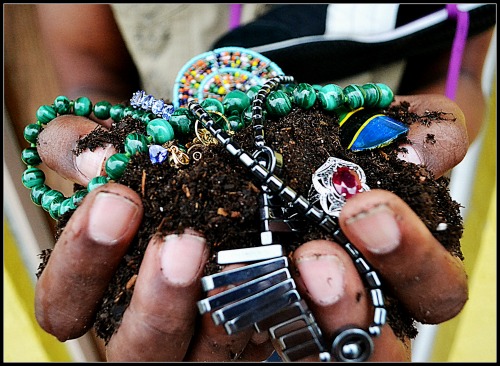 “Hey bro, vipi? How much for these shoes?” I ask the second-hand market vendor.
“Hey bro, vipi? How much for these shoes?” I ask the second-hand market vendor.
“Ah! Those, for you, those are $30 U.S.dollars,” he responds with a tone indicating that he’s giving me a deal. He didn’t know I was Tanzanian, maybe because I hadn’t yet spoken more than a few words in Kiswahili. Words that any foreigner who cared to find out would have known.
“$30?! I can get a new pair of shoes in the U.S. for that amount!” I say in return, flabbergasted by the price this man just gave me.
After a few minutes of haggling, going back and forth about the quality of the shoes, and his realization of my nationality, we do not close the sale of these shoes, but commence having a very important conversation about the poverty of Africa.
I will call this man Peter, as I do not recall his name.
As I talked down the price of the shoes, Peter said things like, “You people have money!” and “Come on, you can pay this amount easily.”
When Peter and I started talking (immediately after I decided not to purchase the shoes), I asked him his reasons behind hiking prices up so high for foreigners. He simply said, “Because we are poor here in Tanzania, and in Africa, so I have to try to earn money some way, and you guests have the money.” (more…)
I am a mom amongst some other titles life has fortunately given me. I love photography & the reward of someone being really happy about a photo I took of her/him. I work, I study, I try to pay attention to life. I like writing. I don't understand many things...especially why humans treat each other & other living & inanimate things so vilely sometimes. I like to be an idealist, but when most fails, I do my best to not be a pessimist: Life itself is entirely too beautiful, amazing & inspiring to forget that it is!
More Posts
Follow Me:


by Fiona Biedermann (Australia) | Oct 7, 2013 | 2013, Being Thankful, Communication, Economy, Family, Health, Husband, Inspirational, Life Balance, Life Lesson, Motherhood, Oceania, Older Children, Relationships, Stress, Teenagers, Working Mother, World Motherhood
 I try to do the right thing most of the time by setting a good example for my teenage / adult children. However, like most mothers, sometimes I’m torn between doing what feels right for me and doing what might be right for the family. I guess that’s because sometimes the two are in direct conflict, or often they seem to be.
I try to do the right thing most of the time by setting a good example for my teenage / adult children. However, like most mothers, sometimes I’m torn between doing what feels right for me and doing what might be right for the family. I guess that’s because sometimes the two are in direct conflict, or often they seem to be.
On the 9th of August, I walked out of a well-paying job with a company that I’d been with for 12 years. I gave my requisite four weeks’ notice with no job to go to, no immediate plans and only a belief that I had to take the leap because I believed I deserved better.
It was perhaps a little selfish financially in terms of my family, and my husband was totally against me resigning without something else to go to. He had legitimate reasons given that the job market in Australia is considerably flat at the moment, as I’m sure it is in many countries.
I was also worried whether I was setting the right example for my children by just walking away from a good job, I was basically throwing in the towel because things had gotten too hard. My husband is also not a man who likes change, which made my decision even more difficult.
The thing is for many months I felt like I’d been dying inside, I felt like my job was sucking the life out of me. I was working in a company which was under new management and was undergoing massive change and restructuring. The biggest problem was that the importance of change management and communication had gone out the window, things that I hold in very high regard.
Morale had dropped, staff were miserable and were leaving in larger than normal numbers. In the end I decided that my family deserved more than my misery and unhappiness and more than that, so did I. Home was not a happy place for those first few weeks after I resigned, but it hadn’t been for months anyway.
Seven weeks of job searching and plenty of soul searching and I finally have landed the job of my dreams. There are many who voiced their concern and worried about the mistake I was making, those loved ones are now eating their words and telling me that I did the right thing and how brave I was to do it.
My brother recently sent me the following quote, which ironically also arrived in my letterbox in the form of business coaching advertising material in the same week I got the job offer.
“If you always do what you’ve always done, you’ll always get what you’ve always got” Henry Ford
As scary and as uncertain as my decision was, I fully believed in myself and I took the leap. I knew what I wanted and I was determined to find it, plus I was totally prepared to accept whatever might be.
I knew that I may have to take an interim job in the meantime, if that’s what it took to find the right job and still keep my family on track financially.
My decision could have gone pear shaped and turned out badly, but I’m a big believer that sometimes you just have to believe.
The biggest lesson I’ve taught my children is that you have to believe in yourself, fight for what you are worth and be brave enough to follow your dreams. I’m doing exactly that, I’ve landed my dream job with the financial and personal rewards I know I’m worthy of. I’m now excited about going back to work.
What’s the biggest lesson you’ve taught your children and do you back up your words with action?
This is an original World Moms Blog post by Fiona from Inspiration to Dream of Adelaide, South Australia. Fiona can be found writing or reading in every spare moment that isn’t filled up with work and her family.
Image credit Cliparto ID 3130264 – This image is used in compliance with the terms of the Cliparto Standard Royalty Free License Agreement.

Fiona at Inspiration to Dream is a married mother of three amazing and talented MM’s (mere males, as she lovingly calls them) aged 13, 16 and 22, and she became a nana in 2011!
She believes she’s more daunted by becoming a nana than she was about becoming a mother! This Aussie mother figures she will also be a relatively young nana and she’s not sure that she’s really ready for it yet, but then she asks, are we ever really ready for it? Motherhood or Nanahood. (Not really sure that’s a word, but she says it works for her.)
Fiona likes to think of herself as honest and forthright and is generally not afraid to speak her mind, which she says sometimes gets her into trouble, but hey, it makes life interesting. She’s hoping to share with you her trials of being a working mother to three adventurous boys, the wife of a Mr Fix-it who is definitely a man’s man and not one of the ‘sensitive new age guy’ generation, as well as, providing her thoughts and views on making her way in the world.
Since discovering that she’s the first blogger joining the team from Australia, she also plans to provide a little insight into the ‘Aussie’ life, as well. Additionally, Fiona can be found on her personal blog at Inspiration to Dream.
More Posts

by Mannahattamamma (UAE) | Jul 24, 2013 | Cultural Differences, Economy, Expat Life, Human Rights, Older Children, Politics, UAE, World Motherhood
 Decades ago, as I moved around Manhattan from cheap apartment to cheap apartment, most of my stuff fit into “New York luggage:” big black Hefty garbage bags. Now that I’ve acquired children, however, and all their junk precious possessions, the New York luggage has been retired. Now I have to hire professionals, like the team of four guys who hauled our furniture and approximately eighty gazillion boxes into long-term storage when we moved from New York to Abu Dhabi two years ago. It took us more than three days to finish that move—I’m sure those movers still have a dart board with our apartment number at its center.
Decades ago, as I moved around Manhattan from cheap apartment to cheap apartment, most of my stuff fit into “New York luggage:” big black Hefty garbage bags. Now that I’ve acquired children, however, and all their junk precious possessions, the New York luggage has been retired. Now I have to hire professionals, like the team of four guys who hauled our furniture and approximately eighty gazillion boxes into long-term storage when we moved from New York to Abu Dhabi two years ago. It took us more than three days to finish that move—I’m sure those movers still have a dart board with our apartment number at its center.
That move almost killed me—and I’m not even including the hours we spent packing and re-packing the twelve suitcases we were lugging to Abu Dhabi, in a desperate attempt to make sure that no one suitcase went over the weight limit for checked bags.
So after that move, moving from one neighborhood in Abu Dhabi to another was a piece of cake: on moving day, a squad of ten men showed up armed with huge rolls of bubble wrap and cardboard; they fanned out across our apartment and hey presto! the contents of our apartment vanished in a few days.
When we moved from New York, I don’t remember thinking much about the difference between my life and the lives of the men putting our boxes in the truck. At the risk of generalizing, I assumed that I had more education than they did, and that my children probably went to “better” public schools than theirs did (if even they had kids). I mean, I know I’m generalizing here—and maybe the movers were PhD candidates in philosophy out to make an extra buck, but that seems like a stretch. (more…)
After twenty-plus years in Manhattan, Deborah Quinn and her family moved to Abu Dhabi (in the United Arab Emirates), where she spends a great deal of time driving her sons back and forth to soccer practice. She writes about travel, politics, feminism, education, and the absurdities of living in a place where temperatures regularly go above 110F.
Deborah can also be found on her blog, Mannahattamamma.
More Posts
Follow Me:

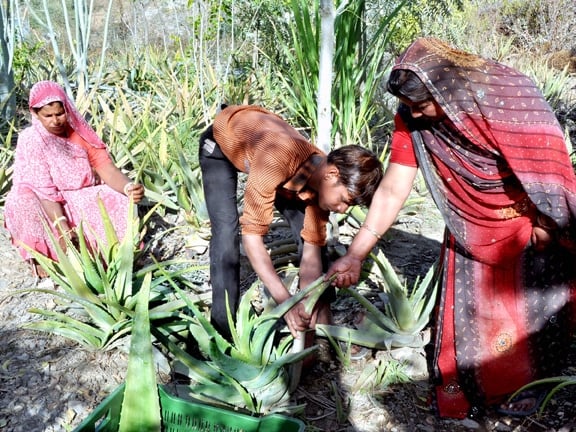
by Purnima Ramakrishnan | Jul 23, 2013 | Casting a Wider Net, Economy, Education, Feminism, Government, Human Rights, Humanity, India, Inspirational, International, Motherhood, Nature, Purnima, Social Good, The Alchemist, United Nations, Women's Rights, World Moms Blog, World Voice
A couple of weeks ago, we featured a remote village, Piplantri (Western India) on the Gates Foundation. Piplantri is a model village, whose actions of change have been very well received all over India.
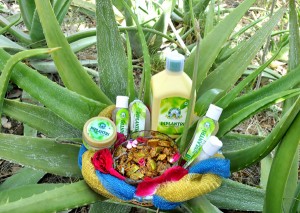
Aloe Vera products from the small scale industries
They plant 111 trees for every girl child who is born, create a fixed deposit of INR 31,000 (approx. USD 620) in her name which attains maturity when she is 18 years old and chalk up a legal agreement between the parents of the girl child and the government that they won’t get their girls married off before she is 18 years old. They also have Aloe Vera industries in which the women of the village are employed. So they have achieved MDGs #3 (promote gender equality and empower women), #4 (reduce child mortality), and #7 (ensure environmental sustainability) at one go. Today on the blog, I would like to introduce Mr. Shyam Sundar Paliwal and his wife, Anita, who were the pioneers of this change action in their village. Anita is 42 years old, and she got married after she finished her 12th grade. It was an arranged marriage and the couple were happy.
Their first daughter Kiran was 18 years old when she passed away. She died due to dehydration. That was the turning point in their life, and they vowed to make lives of others happy.
They also have another daughter Hemanshi (22) and a son Rahul (15) who is in 10th grade. Hemanshi is married and has a child, too.
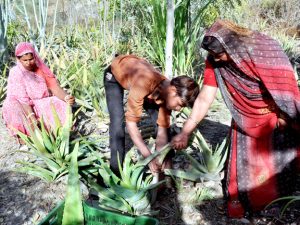
The women of the village tending Aloe Vera
Anita recalls that when she came to her in-laws place after she got married, the first lesson she received from her father-in-law was to plant banana saplings such that they bear fruits during the rainy season and then plant mango saplings around the banana trees. Banana trees absorb water during the monsoon and transfers this water to the mango trees through its roots during the arid summer season. She says she has stuck to this piece of advice to date in her village and ensured that her villagers follow such age-old farming wisdom.
Anita, who is the wife of the ex-sarpanch (ruling political head) of the village, Piplantri, is a very active community member. She is a Zila Parishad Member (Elected person of the district council). Her husband has always been supportive of her as a woman and wants her to do her best for her villagers. He has never restricted her in any way. Though she is more educated than him, he has never been jealous of her, but has only encouraged her and furthered her growth and development as an active member of their society and community. She says, if only all women of the world gets a husband like Shyam, the women of the world will be better off and we would not be speaking of women’s rights here.
Shyam Sundar won the panchayat elections in 2005 and he says he first wanted the people who worked in the government offices to be comfortable. He installed the first AC in the office, brought in some comfortable furniture and ensured that people in all echelons of the society were treated equally. (In rural India, at times, the upper caste people are given more respect and sit on chairs, whereas the lower caste people are treated shabbily and sit down on the floor. Read more about the Evils of Caste system in India here). He said, he worked on the psychology of the ruling body to make them happy and comfortable. He says, only if they are happy, they would start working on reform measures and help provide for the remaining villagers. He, at his own expense, made the offices a comfortable place to work and conducive to provide better results.
He started small. In this difficult water shortage era, he diverted the waste water from all houses/offices towards the fields. Better water conservation was ensured. If waste water does not stagnate anywhere, there would be no mosquitoes and no dengue and fewer diseases. So, he solved primarily problems with simple, cost-effective solutions.
He installed drinking RO water systems in schools. Brought in furniture for the students and made the public schools better than the expensive private schools. People started flocking towards government schools. He raised awareness slowly and in a small way, which evolved out.
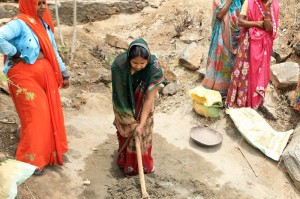
Mrs. Anita Paliwal working on the Water Harvesting Structure
He started rain water harvesting with the help of government. He built canals. He used the women of the village who were unemployed. To the left is a picture of Anita, who at times does not hesitate to get into the fields with a mean sickle. She and her husband were instrumental in starting the water harvesting structure of the village. In most of his welfare activities 90% of the employed are women and 10% alone are men. Women of the village have been blessed indeed to have him there, says Anita. In addition to 25,00,000 Aloe Vera plants, there are 10,000 rose shrubs which are also used in small-scale industries for toiletries and medicinal supplements. Women are employed in all of these schemes.
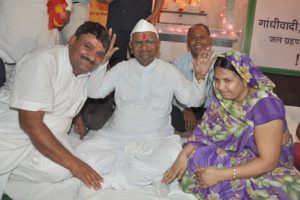
Mr. Shyan Sundar Paliwal and Mrs. Anita Paliwal with Anna Hazare
He started the Kiran Nidhi Yojna with the 76-year-old International Social Activist, Anna Hazare to ensure that no girl child is married off before 18 years old. This man who himself did not study in a college, ensures that all girl children in his village get a college degree. He also nudges the parents to get their girls married off in collective wedding, so that money is conserved and better utilised for other public welfare schemes or for their own savings. This scheme also granted government land to the parents in return for planting 111 trees on the birth of their daughter in that land, and tending to it to fruition before their girl child is 18 years old. On the death of any community member, the family is requested to plant trees again.
He says this again works on their psychology. The girl children treat the trees as their own brothers and sisters. After all, the saplings were planted on the day of their birth. And the parents get emotionally attached to the trees which came into existence on the day their family member was born or died. They then take care of it as a family member, and would under no means cut it down. He says, it is all in the hearts of the people. If people get involved with their hearts, anything is possible. He made people to get emotionally attached to nature and trees and the earth.
I learnt something new from Anita and Shyam that day – Ecofeminism. It is such a beautiful concept. Women and nature have been connected since time immemorial and this couple have harnessed it.
After all, he who was not highly educated could work on such things and make that beautiful village into a heaven, he says, the whole world could change too. And we would have no need to talk about the MDGs or uplifting of any downtrodden society/community.
When asked how he felt when his village was showcased by the Gates Foundation on their Blog, he gushed with happiness and pride. The district collector and Panchayat officials were so excited, too, he said. But his only complaint was that he could not get a hard copy of the magazine which he could show his villagers. He is so proud like a father, like the father of the heaven he created.
He also invites donation to his Kiran Yojna Scheme for the fixed deposit of INR 31000 of every girl child born in his village. He invites the contributors, readers and fans of World Moms Blog to make a trip to Piplantri. He wants people to embrace such change and for them to build upon it to suit their own society, and community.
This is an original post to World Moms Blog by Purnima, our Indian mother writing from Chennai, India. Her contributions to the World Moms Blog can be found here. She also rambles at The Alchemist’s Blog.
Photo credit to Piplantri.com
What do you think about the traditions put in place to support girls and women in the community of Piplantri?

by Alison Fraser | Jul 16, 2013 | 2013, Economy, Human Rights, India, Social Good, World Moms Blog
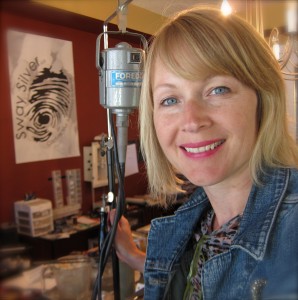
Heather Horsey of Swaysilver jewelry
As we all know, raising children in today’s society can be a financial challenge for many. As mothers, we are often seeking the best deal on the purchases we make. Like many, I do consider myself to be a responsible consumer and I try to purchase from ethical sources.
The recent tragedy in a Bangladesh factory that resulted in the loss of hundreds of lives, however, revealed that some of the stores that I purchase from on a regular basis were in some way or another linked to the poor working conditions of this particular factory.
The majority of those who lost their lives that tragic day were our fellow mothers, working to provide the basis necessities of life to their families.
Those lost in the building collapse have not been far from my thoughts since that day. My appreciation has greatly increased for the companies run by my fellow Canadian moms who I know put the ethical treatment employees as a top priority in their company operations. Peekaboo Beans, Redfish Kids Clothing, KiKi Kids, and Red Thread Design are some of my favourite Canadian brands started and operated by some fabulous Canadian moms.
The success of these businesses lead me to wonder: why can’t all companies choose to manufacture goods in an ethical manner? Isn’t it a fundamental obligation of ours? Why is that for some, despite the obvious financial challenges, this is of such high importance, and yet for many, it is not? In order to address this issue, I decided to speak to a friend and local artisan, who I know has given this very topic much thought and consideration.
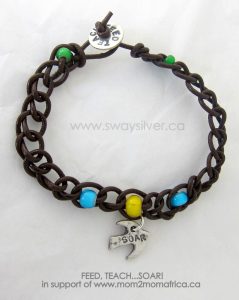
Soar bracelet by Heather Horsey
Heather Horsey makes beautiful silver jewellery in my Canadian hometown. She recently designed and marketed a “Teach, Feed, Soar” bracelet benefitting my not for profit organization, Mom2Mom Africa. I asked Heather why she chooses to run her business, Swaysilver, in such an admirable and ethical manner.
Her response was equally as admirable: “It’s no secret that for centuries the jewellery industry has been wrought with social injustices and it’s good to see some headway being made in the ethical production of jewellery by using recycled materials and lab-created gemstones. The metal I use is recycled silver, harvested from catalytic converters from the car manufacturing industry. In my opinion, a lot of good has come out of creating jobs overseas, however, it is in the best interest of everyone to make sure the working conditions are safe and pay is fair”.
It is common knowledge that overseas factories provide a huge cost-savings to many companies, enabling them to provide products to interested purchasers at bargain prices. This is a huge challenge to entrepreneurs, like Heather, who are trying to provide products at a competitive price without compromising ethical standards.
According to Heather, “while bargains are enticing, I’d rather buy from a company that I know is going above and beyond to put caring for people first no matter where the product is being made. Competing in price is a challenge only when it is assumed that I should be able to make by hand something that is quickly made by machine in a factory overseas. I do my best to create designs that are original and artistically interesting in order to set my work apart from something that is mass-produced”.
I truly believe that we need to shift our focus from finding the best possible bargain to instead ensuring that our purchased products are being made in a manner that provides safe and respectable working conditions for employees. I encourage everyone to research the way in which products from your favourite companies are produced. Our actions have a direct impact on the lives of many around the world. It is our moral obligation to help those in need, and not endanger the lives of others in order to benefit ourselves. I encourage you to support local artisans and companies of high ethical standards in your communities.
Saving a few dollars can mean the difference between life and death for others.
As mothers and consumers, we have the power to create change and prevent another needless workplace tragedy.
This is an original World Moms Blog post by Canadian writer and founder of Mom2Mom Africa, Alison Frasier.
Are you conscientious about the ethics and conditions under which the products you purchased are sourced?
Alison Fraser is the mother of three young girls ranging in age from 5 to 9 years old. She lives with her family in Cambridge, Ontario, Canada. Alison works as an Environmental Toxicologist with a human environment consulting company and is an active member of the Society of Environmental Toxicology and Chemistry (SETAC). She is also the founder and director of the Canadian Not for Profit Organization, Mom2Mom Africa, which serves to fund the school fees of children and young women in rural Tanzania. Recently recognized and awarded a "Women of Waterloo Region" award, Alison is very involved in charitable events within her community including Christmas Toy and School Backpack Drives for the local foodbank.
More Posts - Website
Follow Me:


by Natalia Rankine-Galloway (Morocco) | May 29, 2013 | Childhood, Economy, Expat Life, Eye on Culture, Humanity, Morocco, Parenting, Poverty, Travel
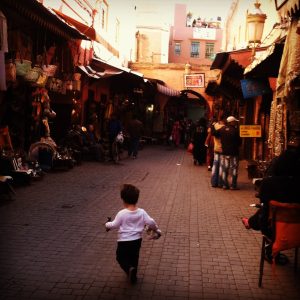 My mom loves to tell stories about her girls…to anyone who will listen. One of her favorites is about my first plane ride home from her native Peru. At age 6, as I sat in the window seat watching Lima fade away beneath us, I turned to her and said (with wisdom far beyond my years my mum will add) “the trouble with Peru is that the Peruvians don’t take good care of it.”
My mom loves to tell stories about her girls…to anyone who will listen. One of her favorites is about my first plane ride home from her native Peru. At age 6, as I sat in the window seat watching Lima fade away beneath us, I turned to her and said (with wisdom far beyond my years my mum will add) “the trouble with Peru is that the Peruvians don’t take good care of it.”
Admittedly it is one of her less embarrassing stories, better by far than the one that has me passing most of a Greek holiday with a potty on my head. And lately, as my son gets older, I’ve been thinking more about it.
By the time we leave Morocco this fall, he will not quite be three. Throughout our time here, that fact made me sad. There is likely little if anything that he will remember about our year in Morocco and our travels in North Africa. But now, this has also made me slightly grateful.
I have started to see the cogs turning in his little head when we pass the women begging on the street, with toddlers his age strapped to their backs. I see him watching the kids selling cartons of tissues at the stop lights as I guiltily roll up the window.
As his little eyes observe more and more I am starting to be glad that we will leave before the questions start. He hasn’t progressed much past the basic two-word toddler interrogatives: dada gone? more biscuit? But I am imagining the questions forming, and I need more time to come up with good answers.
When he asks me about these babies on their mothers backs, or the ones selling on streets, what do I say? Moreover, how do you explain your own role in the perpetuation of this inequality. How do I explain that being asked for the 19th time in one day to spare just 1 dirham irritates me more and more in spite of the fact that had I given one each time, I would now be short only $2? How would I explain that the shoes he’s wearing would cover our gardeners weekly salary?
Observant though I might have been at age 6 about the socio-economics of Peru, it did not give me any head start on figuring out any actionable recommendations for the Peruvians about how to improve their problems of poverty, inequality, pollution. Nor do I have any for Morocco now, some 25 years later.
I am a big believer in my own and my son’s capacity to save the world. I take part in fundraising campaigns, donate to charity and volunteer. I will always encourage him to live a life of tolerance, patience and understanding. But when you live in the midst of an unequal society – to what extent are you compromising your principles by continuing to live in the manner to which you are accustomed?
So while I doubt that I will ever come up with any Nobel Peace prize winning solutions to global income inequality myself, I would at the very least time to come up with a way of explaining poverty to my son. I would like to be able to explain to him that he is lucky without teaching him conceit or entitlement. I would like to teach him that our relative wealth comes with a responsibility to those less fortunate in such a way that empowers and doesn’t leave me stinking of rank hypocrisy when I look away from the outstretched hands on the street.
How do you teach your children about income inequality when you are living on the “have” side of an unequal society?
This is an original post to World Moms Blog by our contributor, Natalia Rankine-Galloway, who writes at The Culture Mum Chronicles. She is now writing from the U.S. Embassy in Morocco.
Photo credit to the author.

Natalia was born a stone's throw from the Queen's racetrack in Ascot, UK and has been trying to get a ticket to the races and a fabulous hat to go with it ever since. She was born to a Peruvian mother and an Irish father who kept her on her toes, moving her to Spain, Ireland and back to the UK before settling her in New York for the length of middle and high school. She is still uncertain of what she did to deserve that.
She fled to Boston for college and then Washington, D.C. to marry her wonderful husband, who she met in her freshman year at college. As a military man, he was able to keep her in the migratory lifestyle to which she had become accustomed. Within 5 months of marriage, they were off to Japan where they stayed for a wonderful 2 and one half years before coming home to roost. Baby Xavier was born in New York in 2011 and has not slept since.
A joy and an inspiration, it was Xavier who moved Natalia to entrepreneurship and the launch of CultureBaby. She has loved forging her own path and is excited for the next step for her family and CultureBaby.
Natalia believes in the potential for peace that all children carry within them and the importance of raising them as global citizens. She loves language, history, art and culture as well as Vietnamese Pho, Argentinian Malbec, English winters, Spanish summers and Japanese department stores...and she still hopes one day to catch the number 9 race with Queen Liz.
You can find her personal blog, The Culture Mum Chronicles.
More Posts

 “Hey bro, vipi? How much for these shoes?” I ask the second-hand market vendor.
“Hey bro, vipi? How much for these shoes?” I ask the second-hand market vendor.





















